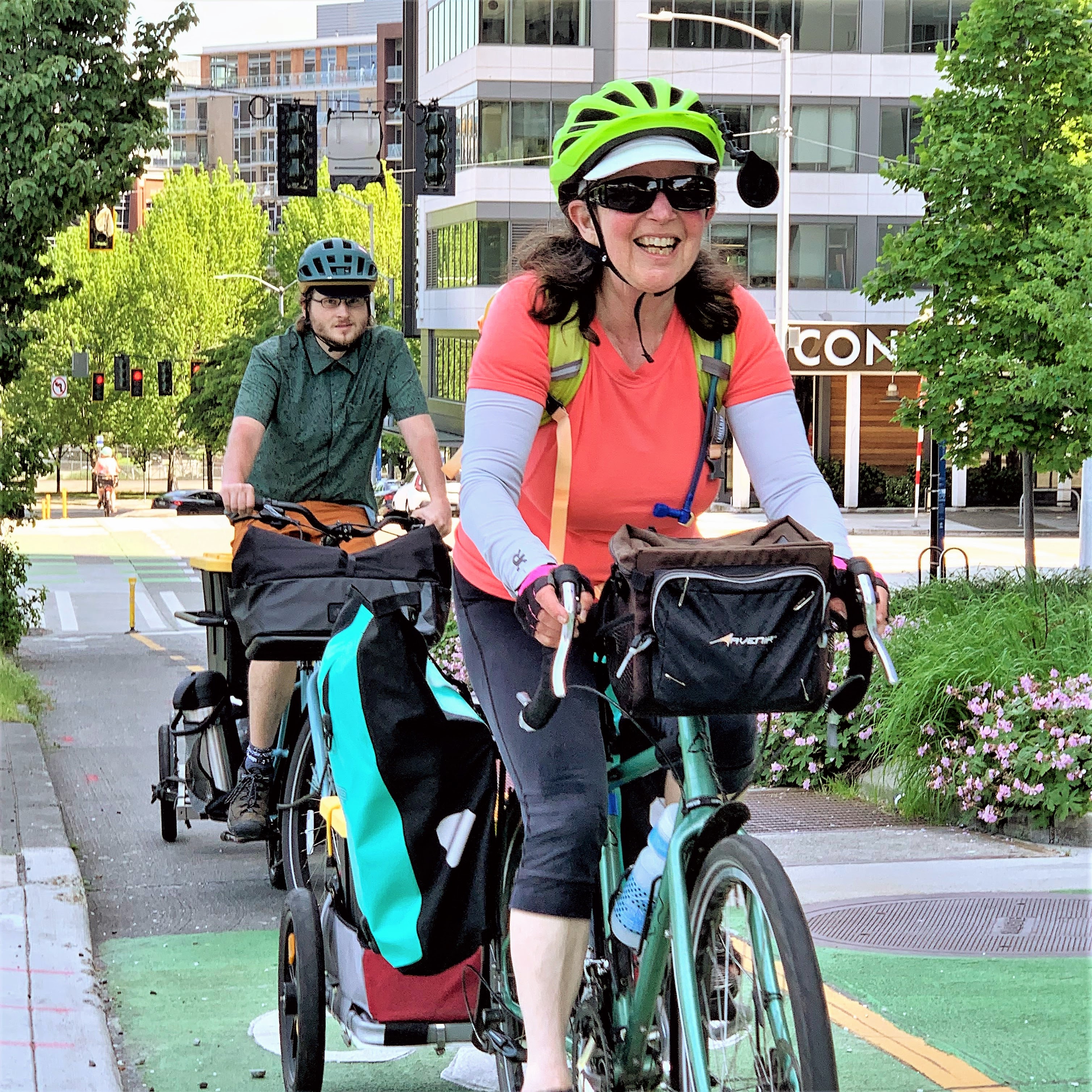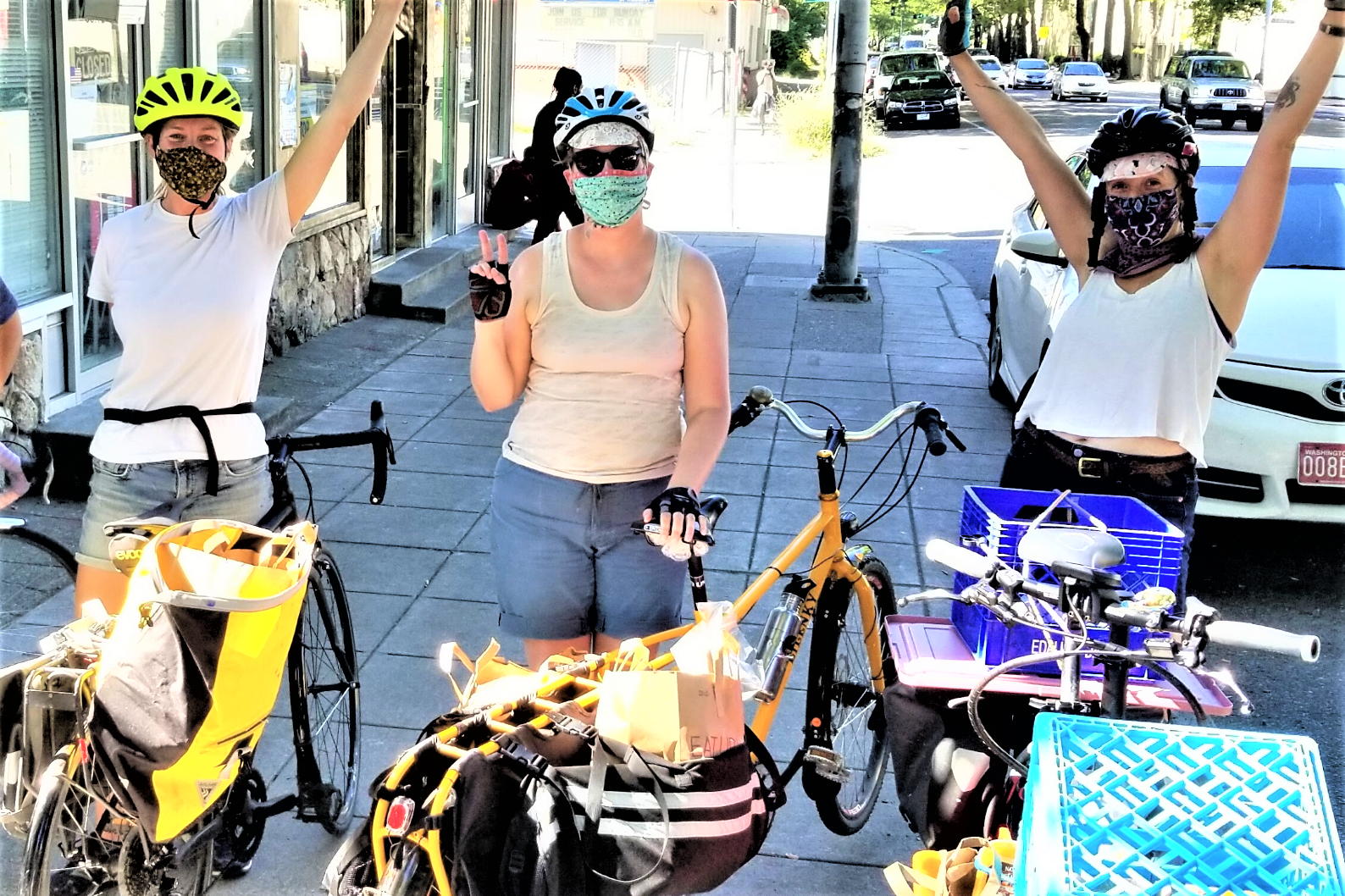-
Cascade's Pedaling Relief Project is fighting food insecurity, reducing food waste, and cutting greenhouse gas emissions by using bikes and volunteer riders for last-mile deliveries that support Seattle food banks.
-
It's bicycling as community service.
-
With 1.2 million pounds transported, the Pedaling Relief Project is a model for cities nationwide.

Seattle Mayor Bruce Harrell joined Cascade Bicycle Club at the University District Food Bank on Nov. 3 to celebrate the Pedaling Relief Project and its milestone achievement of transporting more than 1.2 million pounds of food by bicycle.
"It's activities like this that demonstrate why we are so great," Harrell said about Seattle's leadership in using bikes to serve the community. The Pedaling Relief Project, he added, “has taken the best of our values, environmental sustainability, thinking about those who are most vulnerable…and put them together.”

Begun in 2020, the Pedaling Relief Project engages volunteers to rescue and deliver food on behalf of five Seattle food banks to benefit food-insecure neighbors.
Cascade Executive Director Lee Lambert calls the Pedaling Relief Project "the largest bicycle-powered food rescue and transport effort of its kind in the country."
University District Food Bank Executive Director Joe Gruber also praised the project. "It helps us and the other food bank partners achieve their mission at a time when volunteerism is not keeping pace with the growth in need for our services,” he said.
Following the event with the mayor, a team of volunteers pedaled to Trader Joe's and a Safeway supermarket to rescue food, which they transported back to the University District Food Bank. See our photos below of the Trader Joe's food rescue ride.



Cascade provides bike trailers to volunteers that attach to almost any bicycle or e-bike. We offer volunteer food bank rides from Wednesdays through Sundays. Sign up here.
A National Model for Last-Mile Deliveries
Begun during the pandemic to fight rising food insecurity caused by job losses and economic uncertainty, the Pedaling Relief Project has since grown to become one of Cascade Bicycle Club’s most beloved and successful initiatives. The statistics are powerful:
-
1.2 million pounds (600 tons) of food and goods transported by bike since 2020;
-
20,000+ miles ridden by volunteers on food rescues and deliveries;
-
18,000 pounds of CO2 emissions avoided.

The Pedaling Relief Project is a national model for the use of bicycles, cargo bikes, and electric bikes to support community needs, lower carbon emissions from transportation, reduce food waste and food insecurity, and improve the efficiency of last-mile deliveries in dense urban environments.
The University of Washington's prestigious Urban Freight Lab recently included the Pedaling Relief Project in its research paper "Biking the Goods," which presents the Cascade initiative as a national example of how cargo bikes are being used to serve an important public need.
Cascade is calling attention to this program with the goal of gaining support from the business community, philanthropic organizations, and to encourage more members of the bicycle community to sign up as a Pedaling Relief volunteer. The program costs around $200,000 a year for Cascade to run and it provides a crucial service to local food banks.
“We encourage Seattle public officials and business leaders to learn more about the Pedaling Relief Project and its positive impacts,” Lambert says. “With hunger an ongoing issue in our community, bikes are showing the power to serve critical community needs.”
“The Pedaling Relief Project can be a national model for bike nonprofits, community aid organizations, and municipal governments partnering with food banks and city governments to create similar programs that transport goods by bike,” says Maxwell Burton, Cascade’s community engagement manager and the Pedaling Relief Project co-founder.

A Transformative Volunteer Experience by Bike
The Pedaling Relief Project is more than a mutual aid program. It transforms the lives of volunteers. Empowered by the first-hand experience of delivering goods by bike, volunteers begin to view their bikes as the best-choice for many daily tasks that no longer require a car: pedaling their children to school, grocery shopping, and commuting to work, Burton says.
Click here to learn more and sign up for Pedaling Relief Project ride. It's healthy bicycling as service.

Share this post
